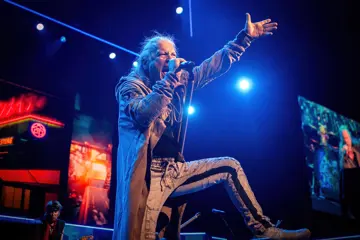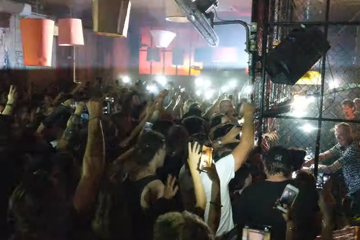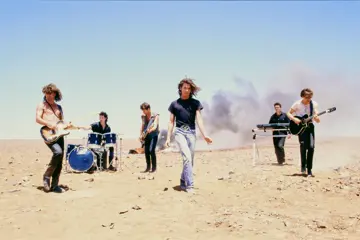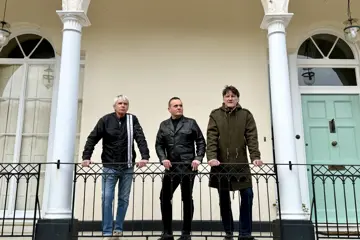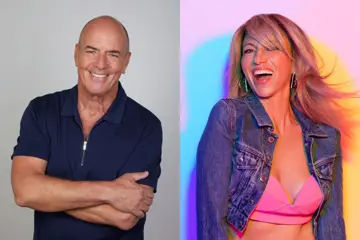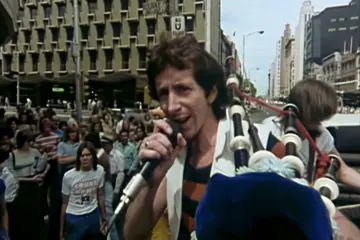“I met this guy, Chris Lambrianou, who was in The Firm (the Kray's gang). He had gone to prison with them for 15 years, and took me on a tour of the East End one day. I had asked various people about Francis (Reggie's wife), people don't recall her, and there isn't a lot written about her. I had almost given up on finding out about her, and I said to Chris at the end of the day if he could tell me about her. 'Francis is the reason we all went to prison', he replied.
“I stopped in my tracks,” Helgeland paused, “I knew the movie had arrived.
“After Francis, Reggie shut down and stopped functioning as a gangster. That seemed to me the key of the whole story. So I became very interested in her.”
So Helgeland, wrote and directed Legend from the perspective of Reggie's wife. Through her we are granted an insight into this criminal underworld
Almost 50 years later the Krays are still a rich and diverse topic to explore. A score of books have been published about them, three in the last year alone. Unfortunately a lot of these books are of often of a tabloid or lurid nature.
“I was taken by how little was known about them, as far as solid truth. Everyone knows the date they were born, the date they went to prison, the date they killed Jack McVite, and all those things. Yet who they were and what they were like, that was up for grabs in a lot of ways. I've never come across two people - that have only been dead for a couple of years - that were thought of in such extremes. They were nailing people to the floor, or they were helping old ladies across the street. I became very interested in finding a middle to all that, a story to tell.
Don't miss a beat with our FREE daily newsletter
“Duality is inherent in the twins. They are a bit of Yin and Yang to each other. I found out some very curious things about them. Ron was very upfront, honest about who he was and what he wanted. Reggie was much more duplicitous, much more secretive. He was one thing to one person, and another thing to another. They were contradictory in a lot of ways, even in how they fought. Reggie was calculated and technical, while Ron was a brawler. They were always opposites.”
Playing both Ron and Reggie fell to Tom Hardy. Helgeland was left with the task of getting the same actor on screen, twice, and to make sure it didn't take the audience out of the movie. “We didn't want the camera to be conscious of the one guy playing two parts. The rule was; block it naturally, as if you had two actors playing the parts. That was the way we were going to go about staging and shooting it. So we were trying not to make a big deal about it, so it was not a big deal. We try not to be self-conscious, so the audience can believe what they are seeing.”
Hardy helped in this process, granting a distinctive life to both characters. So convincing in fact that it lead to some unusual situations on set. “We were always under the gun, we never had enough time, and the Director of Photography says 'let's shoot that thing for Ron while we're waiting for Reggie'. We were just staring at him, never said anything, and he just put his head in his hands and waved us off. Things like that happened a lot, which is a tribute to how different Hardy was.”
Creating a convincing look for the era was also a challenge “First of all that's what movies are supposed to do, take you somewhere you couldn't go to. When it's another planet - in the case of science fiction films - that's an obvious thing. In this case it was the London of the 1960's, which is a very specific time and place. Their version of it was not The Beatles. It's much more clubland. A gangster's world. So we had to be careful not to let that other version of the '60s into our version.”
Beside the large sets for the club interiors, this involved shooting at numerous street locations around London and utilising computer graphics to tie the different areas together. Ultimately, they had to recreate the rundown exteriors of an East End that is no longer there.
Legend represents Helgeland's seventh film as a director, but he has been writing in Hollywood for decades (including an Oscar for his LA Confidential script). As for his preferred job, it's a pretty obvious answer.
“Directing is by far the best job. It's social. You have a million talented people helping, all knowing their job and doing it well. Writing is much more difficult and lonely. When I go to my office in the morning, there aren't six people waiting to help me. Directing is the reward for the difficulty of writing.”


